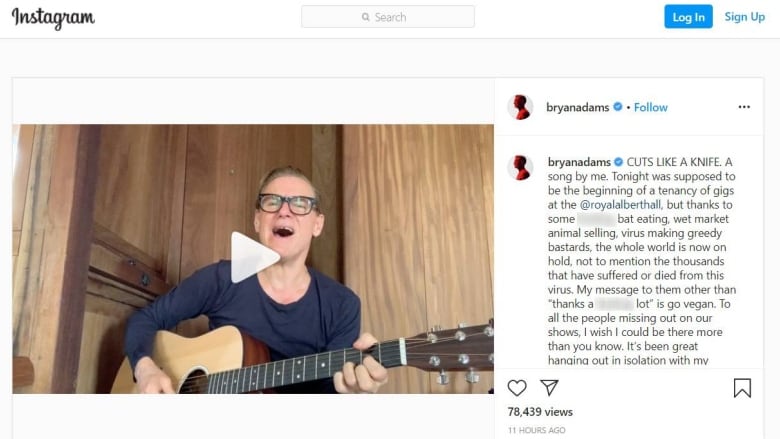Bryan Adams's Instagram post draws rebukes from Chinese-Canadian organization, social media users
WARNING: This story contains offensive language

UPDATE, May 12, 2020: Bryan Adams apologizes for expletive-filled Instagram post that some deemed racist
A prominent Chinese-Canadian activist says she is shocked, disappointed and angry about an Instagram post on Canadian singer Bryan Adams's official account that she and others say is racist.
The post contains a snippet of Adams singing his hit song Cuts Like a Knife. An accompanying description expresses his frustration that COVID-19-related restrictions have led to the postponing of three shows at the Royal Albert Hall in London, England.
"Tonight was supposed to be the beginning of a tenancy of gigs at the @royalalberthall, but thanks to some f--king bat eating, wet market animal selling, virus making greedy bastards, the whole world is now on hold," the post read.
"My message to them other than 'thanks a f--king lot' is go vegan."

Amy Go, president of the Chinese Canadian National Council for Social Justice called the post racist and believes it could stoke hatred of Chinese-Canadians.
"People look up to public figures. He is seen as an idol by many," Go said. "It justifies this racist hatred against Chinese … This is so irresponsible and just so, so, so, so racist."
As the coronavirus pandemic has spread, many have raised concerns about growing anti-Asian and anti-Chinese racism in Canada, with reports of anti-Asian hate crimes on the rise in Vancouver, including physical and verbal attacks.
Adams apologizes Tuesday
CBC News contacted Adams's representatives for a response Monday night but did not receive an immediate reply.
But on Tuesday morning, the singer issued an apology on Instagram "to any and all that took offence" to his post. He said he just wanted to rant about "animal cruelty in the wet-markets being the possible source of the virus, and promote veganism."
"I have love for all people and my thoughts are with everyone dealing with this pandemic around the world," he wrote in the post.
The apology post also included a video of Adams singing his single Into the Fire.
As of 10 p.m. PT Monday, his original Instagram video had received more than 1,500 replies.
Many of the comments expressed love for his music and dismay he would not be touring, but dozens of others accused Adams of racism.
"Wow. What racist garbage coming from someone I respected," wrote Instagram user @globalcanuck.
"Lol, look at this casual racism," wrote @got_thall.
"I thought you'd be a better human being than this," wrote @annaliserae80. "The beginning of your message is some seriously racist garbage and everyone here agreeing with you is disgusting."
By Monday evening, Bryan Adams was trending on Twitter.
Bryan Adams' racist xenophobic tirade has been up for 10 hours now. Damage has been done.
—@karliwithakayanybody have ‘bryan adams racist meltdown’ in the 2020-is-a-hot-mess pool <a href="https://t.co/RiF5Ca1ErC">pic.twitter.com/RiF5Ca1ErC</a>
—@RaxKingIsDeadAnimal rights organization PETA offered a reply to the video supporting Adams's message of vegan advocacy.

CBC News contacted the organization to ask if they had any concerns about the message but did not receive an immediate reply.
Celebrities and misinformation
The World Health Organization said in April that evidence suggests the novel coronavirus originated in animals in China late last year and was not manipulated or produced in a laboratory.
Scientists who have studied the virus genome have found it is likely the product of natural evolution and made the leap from wild animals to humans just as both SARS and MERS coronaviruses did, probably as the result of close animal-human contact.
Early studies suggested the virus could have come from bats. The WHO is still researching the origin of the virus.
University of Alberta professor Tim Caulfield, who is the Canada Research Chair in Health Law and Policy, was one of the many who spoke against the post on Adams's Instagram.
This tweet from <a href="https://twitter.com/bryanadams?ref_src=twsrc%5Etfw">@bryanadams</a>.... ugh. Angry. Stigmatizing. Hate baiting. Scientifically wonky. <br><br>I get that people are frustrated, but this kind of aggressive messaging from an influencer helps no one. cc <a href="https://twitter.com/KatieNicholson?ref_src=twsrc%5Etfw">@KatieNicholson</a> <a href="https://twitter.com/CBCHealth?ref_src=twsrc%5Etfw">@CBChealth</a> <a href="https://twitter.com/picardonhealth?ref_src=twsrc%5Etfw">@picardonhealth</a> <a href="https://twitter.com/hashtag/COVID19?src=hash&ref_src=twsrc%5Etfw">#COVID19</a> <a href="https://twitter.com/hashtag/coronavirus?src=hash&ref_src=twsrc%5Etfw">#coronavirus</a><a href="https://twitter.com/hashtag/Community?src=hash&ref_src=twsrc%5Etfw">#Community</a> <a href="https://t.co/nGAY4caYZY">pic.twitter.com/nGAY4caYZY</a>
—@CaulfieldTimHe said in an interview that the message feels "filled with hate" and has a "tinge of racism" and is not built on science.
"It was not made by anyone as [Adams] implies," Caulfield said. "We don't know that it came from a wet market. A bat may have been involved, in fact, some interesting research recently ... definitely points in that direction.
"But we don't know where it's come from. Certainly not enough to justify this kind of anger, this kind of finger pointing."
Caulfield says research has found much of the misinformation around the coronavirus comes from celebrities.
"So, this matters," said Caulfield.
"It amplifies a message. And even if you're not a fan of Bryan Adams, this kind of messaging can have an impact."
With files from Katie Nicholson, Reuters. The Canadian Press
